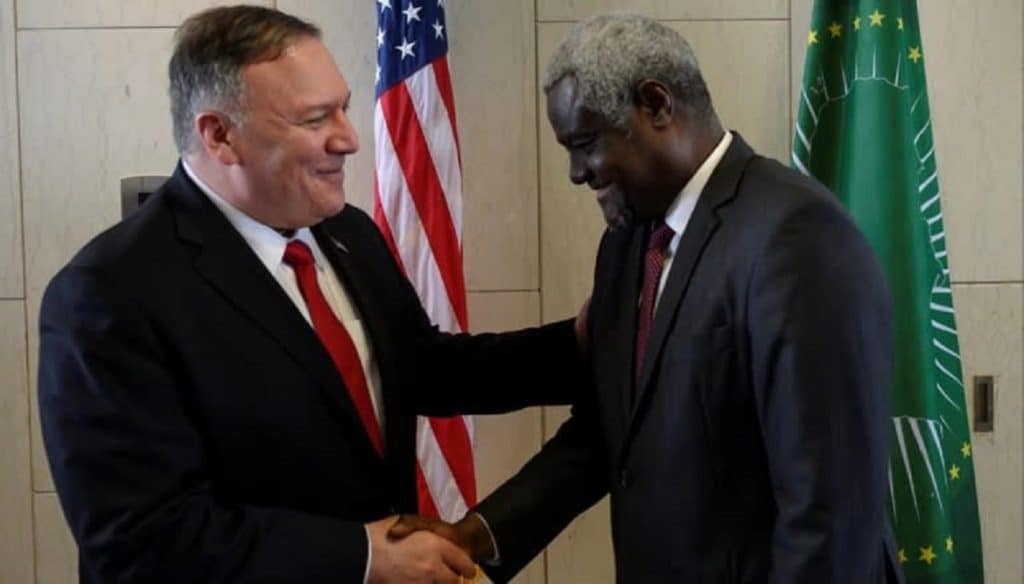The interest of the United States and Israel in Africa is due to the implementation of the new strategy, from the point of view of geopolitics, regarding the “brown” continent. As part of this strategy, Washington and Tel Aviv seek to strengthen their influence in the Greater Middle East in order to oust Russia and China from there. This strategy is a symbol of the new era of US-Israeli expansion in Africa.
The desire of the White House administration and Israeli Prime Minister Benjamin Netanyahu to consolidate its position on the African continent is both a manifestation of competition in relation to Moscow and Beijing, as well as a clear sign of the transformation of international strategy, in which influence on the Third World countries plays a special role.
Especially for the World Geostrategic Insights, Denis Korkodinov talked about this with the political expert Rashid Muhammad Ibrahim al-Rashid.
1. On February 15, 2020, US Secretary of State Mike Pompeo began his African tour, as part of which he visited Senegal, Angola and Ethiopia. Experts note that this move is taking place against the backdrop of Americans’ concern about the growing influence of China and Russia in Africa, especially in these three key countries. How can the US oppose China and Russia in Africa? How likely is it that after the visit of Mike Pompeo in Senegal, Angola and Ethiopia, social unrest may begin, directed primarily against Moscow and Beijing?

RASHID MUHAMMAD IBRAGIM AL-RASHID: Washington’s interest in Africa is part of the US foreign policy strategy for the “brown” continent, announced since December 2018, in which China and Russia are classified as enemies of American welfare. The United States seeks to limit the role of the Russian “bear” and the Chinese “dragon” in the jungle of Africa with the help of two main legal means with economic content, namely: through the implementation of legislative measures approved by Congress, by 2028 to deprive China and Russia of any competitive advantages regarding goods, investments and long-term loans. However, this policy faces some practical difficulties, namely, the fact that the US European allies, who are interested in friendship with Moscow and Beijing, have a colonial history of influence on the African continent, and therefore it is very difficult for Washington to create real competition for them here.
Meanwhile, from the point of view of infrastructure projects, especially the construction and development of highways, railways, seaports and the arms market, Russia and China can make a difference if they make better use of soft power in Africa.
The visit of US Secretary of State Mike Pompeo to Ethiopia is a continuation of Washington’s African policy. Ethiopia is an important indicator of the political situation in all African countries. Among other things, it is the control center of the Arab-African conflict amid water and port war with Egypt and Sudan. Ethiopia also plays a central role in US policy in connection with its proximity to Djibouti, the headquarters of the US military command in Africa, which is designed to ensure security in the Persian Gulf, where American interests are present.
The likelihood of social unrest after the African “safari” Mike Pompeo is extremely high, especially in West Africa. And here the threat of Pompeo’s visit to Senegal and Angola is obvious, because what the United States can do under the pretext of fighting terrorism is very dangerous.
It is noteworthy that the White House administration in West Africa is working on the establishment of military observation centers and points out the opposite of its strategy in East Africa, which tends to large military bases, as is the case in Djibouti.
AFRICOM forces are only 5 kilometers from the Chinese base. Therefore, the fact that the intensification of American policy towards Africa is aimed at putting pressure on Beijing is more than obvious.
As for West and Central Africa, the United States is working on escalating conflicts, using extremist groups to play a leading role in achieving goals against Sino-Russian interests. And I mean the active use of the Boko Haram and Silik terrorist movements. This poses a real threat to the Russian military base in the Sudanese city of Um Dafuk.
2. On February 3, 2020, during his visit to Uganda, Israeli Prime Minister Benjamin Netanyahu met with the head of the Sovereign Council of the Sudan, Abdel Fattah al-Burhan. This has become a symbol of a new stage in the influence of Israel on the African continent. At the same time, the United Arab Emirates acted as an intermediary between Tel Aviv and African countries. Why has Israel shown great interest in Africa in general, and in Sudan in particular? It is believed that through Israel, the Sovereign Council of the Sudan intends to limit US sanctions. In exchange for this, Abdel Fattah al-Burhan is likely to create special privileged conditions for Israel in Khartoum and is likely to agree to the opening of an Israeli military base in Sudan. What do you think about this? What is the interest of the United Arab Emirates in Africa?
RASHID MUHAMMAD IBRAGIM AL-RASHID: The meeting of Israeli Prime Minister Benjamin Netanyahu in Uganda was held with the participation of a Sudanese mediator of Jewish origin and the support of the United Arab Emirates. This meeting became a cause of contention in Sudanese public opinion. In particular, many experts have suggested that this meeting does not lead to the exclusion of Sudan from the list of countries sponsoring terrorism. At the same time, the economic effect of this meeting remains doubtful compared to what Israel is doing for Egypt, Chad, Eritrea and South Sudan.
Transitional government officials say Benjamin Netanyahu is in talks to open an Israeli military base in Sudan. This was the result of a secret agreement between Israel, the United States and the United Arab Emirates.
As for the mediation of the UAE in the Israeli presence in Africa, it concerns the opening of offices of public services that are engaged in the realization of the interests of the emirates in the world and improve their image.
3. Recently, South African President Kirill Ramafosu took over the chairmanship of the African Union at the Addis Ababa Summit. In addition, the South African leader noted that his country “will play a role in deepening the review processes and scaling up the implementation of measures necessary to improve governance” through the African Peer Review Mechanism. Does this mean that South Africa is ready to lead the process of African integration? Will Kirill Ramafos manage to significantly change the international image of Africa and contribute to de-escalation of regional conflicts?
RASHID MUHAMMAD IBRAGIM AL-RASHID: The role of Cyril Ramafosu in the African Union is the result of the Lusaka summit on the need for structural reform, especially in the areas of governance that led to the creation of free zones and the revision of the executive functions of the union.
However, South Africa’s presidency of the African Union is likely to be difficult if the countries of the union cannot overcome long-standing differences and embark on a consensus policy. As a last resort, these countries need to agree to neutralize the negative impact on African unity. If this does not happen, Kirill Ramafosu is unlikely to be able to carry out his diplomatic mission for a long period of time, since now his capabilities are extremely limited.
4. A number of international politicians, and in particular, the chairman of the US Senate Armed Forces Committee, James Inhof, believes that the withdrawal of the US armed forces in West Africa will have “real and lasting negative consequences” for the entire continent. Is this really the case? Does the American military presence have a positive or negative effect on Africa? Will Russia and China be able to force the United States out of Africa?
RASHID MUHAMMAD IBRAGIM AL-RASHID: The US military presence in its current form and instruments poses a threat to the African continent as it is based on a divide and conquer strategy that is a continuation of the legacy of ancient European colonialism.
The conflict between Russia, China and the United States is a struggle for income. And this conflict can escalate into a struggle for survival, when we can talk about the possibility of ousting Moscow and Beijing or the United States from Africa. In any case, this struggle will lead to a complete transformation of the entire system of geopolitics, which will inevitably affect the African continent.







